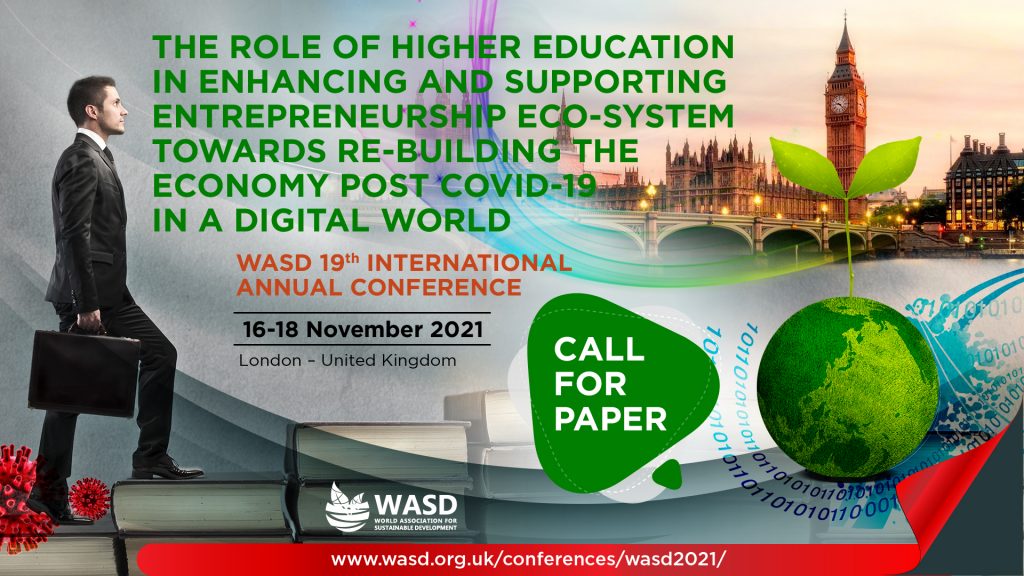Role of Higher Education in Enhancing and Supporting Entrepreneurship Eco-system towards Re-building the Economy post Covid-19 in a Digital World
The Role of Higher Education in Enhancing and Supporting Entrepreneurship Eco-system towards Re-building the Economy post Covid-19 in a Digital World
WASD 19th INTERNATIONAL ANNUAL CONFERENCE
16-18 November 2021
London – United Kingdom
We are hoping the conference will take place in London Face to Face following all the health and legal guidelines by the UK government but WASD is also well prepared for running the conference online is the global pandemic lockdown continues until November 2021. As a result of the ongoing global coronavirus pandemic, for the first time since its inception the Annual Conference of WASD was organised successfully in 2020 remotely via video conference technologies. In doing so, WASD used the latest technology in video conferencing from London with participants from all-over the world connecting from homes. You can browse samples from WASD previous conferences here.
Target audience: Academics, researchers, UN agencies, NGOs, civil society groups, youth, students, private sector, business, SMEs, and other stakeholders.

The conference objective is to introduce a variety of fundamental perspectives on entrepreneurship eco-system to help re-building the global economy and the 17 Sustainable Development Goals (SDGs) of the United Nations 2030 Agenda for Sustainable Development. It is now clearly recognised that innovation and entrepreneurship, as well as being a central driver of economic growth, are also recognised as very important tools to help achieve Sustainable Development (SD). The conference is therefore aims to discuss and explore various approaches and different ways by the Higher Education (HE) institutions (universities, colleges and research institutes) which can contribute to enhance and support entrepreneurship eco-system towards re-building the global economy and the UN Agenda 2030 across the world and more specifically in the Developing Countries (DCs). Moreover, the conference aims to explore and critically analyse the current debates around the role of entrepreneurship and innovation in achieving SD.
Call for Abstracts Research Tracks
The impact of Coronavirus (Covid-19) pandemic global lockdown has led to record declines in gross domestic product (GDP) across the world in 2020. In the United Kingdom for example, according to the UK Office for National Statistics recent reports (2021), the UK has experienced the largest fall in volume or “real” GDP over Quarter 1 to Quarter 3 2020 of the G7 economies. However, with countries across the world taking different approaches, it is hard to make comparisons during this time but generally all countries are taking serious steps and initiative to reduce public expenditure and increase productivity. The multi-sectorial impact of Covid-19 on education is difficult to measure and it is clear that, today, more than ever before in human history, the wealth or poverty of nations depends on the quality of HE. Revolutionary breakthroughs in re-building the economy in the digital world will lead to remarkable changes in the way forward-looking nations capacitate their graduates. In this era of post Covid-19, all HE institutions cannot fail to realise, accept and accomplish its natural and ascribed roles as a strategic agent for national development. HE must confront new realities rapidly manifesting themselves in a diversely complex and fast-changing world. Business as usual will not suffice and therefore HE need to be expansively re-focused in order to become more sensitive and responsive to its mission of developing graduates and researchers who, in addition to conventional graduate training, are also able to fight the intellectual battle for self-confidence and self-assertion as equal players in the global and intensely competitive knowledge economy. It is therefore very important for all HE institutions to undertake robust national and international accreditation process. And although international accreditation opens more opportunities for any institution but both accreditations are of equal importance in their own aspects.
The conference is expected to brings together researchers, policy makers, educators, consultants and employers from around the world to exchange knowledge and experience and discuss recent developments and current challenges in both theory and practice, you can also browse sample of our previous speakers here. The conference program will be published two weeks before the conference date and will normally be tentative and subject to changes due to the large number of participants. For a sample program structure, please check our previous conference programs.
In 2015, the United Nations (UN) General Assembly adopted the 2030 Agenda and its 17 SDGs. The conference will critically address the question of how countries can achieve the 17 SDGs of the 2030 Agenda and to provoke forward thinking on developing new methods and approaches to suit the challenges and opportunities of this new era of digital revolution. These new approaches call for actions to create different appropriate ways of doing things and of doing new things that will be essential to solve our future problems and help in the implementation of the 17 SDGs of the 2030 Agenda. Systematic search for opportunities is important for helping to ameliorate the many problems facing countries. We must therefore produce, consume and organise ourselves differently. Participants are therefore invited to address the following key issues in their contribution: how do you see the role of higher education and research institutions (science, innovation and entrepreneurship) in service of the 2030 Agenda?; how do you reflect the SDGs in your own research activities?; and do you believe that the HE is properly using scientific research in finding solutions to global problems such as the ongoing Covid-19 pandemic?.


Leave a Reply
You must be logged in to post a comment.